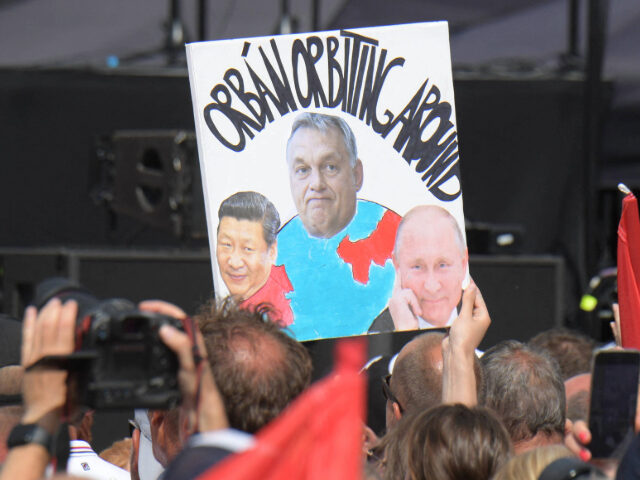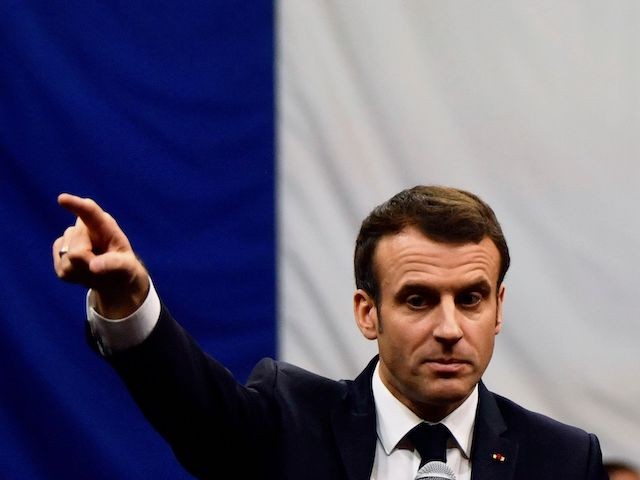China Laments: Europe Is Lost to the ‘Far-Right,' Thanks to ‘Remote Elites in Brussels'
 FERENC ISZA/AFP via Getty Images
FERENC ISZA/AFP via Getty Images
The Chinese state media outlet Global Times concluded Monday that the results of European Parliament elections, which saw expected poor results for leftist and “green” parties, would likely “overturn Europe's policies on immigration, green transition and its support for Ukraine.”
Some of Europe's most influential economies — notably, France and Germany — witnessed preliminary vote tallies resulting in left-wing parties losing seats and apparent significant gains for both popular right and establishment conservative parties. While, as the Global Times observed, “moderate” and socialist parties will likely maintain control of the European Parliament, the dramatic gains that conservative parties expected indicate that many voters are disillusioned with the status quo and open to alternatives.
The Global Times, citing its usual roster of Chinese “experts,” blamed “remote elites” for losing sight of issues important to working- and middle-class Europeans for the results of the election. The “experts” predicted that the results were not outliers but “foreshadowed the continent becoming more conservative and far-right leaning.”
“This trend will likely overturn Europe's policies on immigration, green transition and its support for Ukraine,” the state newspaper predicted.
“Europe is mired in deep crisis now. The continent's current political elites' rule has failed to solve its problems,” one “expert,” Professor Wang Yiwei, was quoted as saying, lamenting that “remote elite” leaders had failed to retain the trust of the public.
Another expert, Professor Cui Hongjian, suggested that the results were not just a protest vote against the left but that “Europe will continue turning conservative and right-leaning, as the mainstream parties have failed to curb the right-wing forces in the past five years.” Cui did not offer any suggestions for how to “curb” unwanted political groups; in China, the Communist Party maintains an unchallenged stranglehold on power backed by the use of brute force against suspected political dissidents.
The experts predicted a “significant impact on Europe's immigration, security and green transition policies, as those are the topics the public is mostly unsatisfied with” — suggesting that European governments would begin limiting how many people they allow in their countries from abroad and curtail excessive spending on anti-climate change “green” projects.
The Global Times notably, however, predicted the results of the election would not have any major impact on Europe's relationship with China despite “far-right” parties increasing their influence and China's government being a totalitarian communist entity.
“Who becomes next US president will have more direct and influential impact on EU's ties with China than the EU parliamentary elections,” the government mouthpiece anticipated.
While the results of the elections have not been totally finalized at press time, some of the biggest expected winners are right-wing parties. In France, Marine Le Pen's Rassemblement National (RN) made large enough gains that French President Emmanuel Macron called for a snap election, dissolving the nation's parliament.

French President Emmanuel Macron (Christophe Simon/AFP via Getty Images)
“We are ready to exercise power if the French put their trust in us in these new national elections. We are ready to restore the country to defend the interests of the French people,” Le Pen said in response to the snap election announcement.
With Germany's right-wing populist Alternative for Germany (AfD) expected to gain 17 seats in Brussels, Macron's move has put pressure on German Chancellor Olaf Scholz to call an election, as well. In Belgium, Prime Minister Alexander De Croo responded to the electoral collapse of “green” parties by resigning.
In Spain — where the Socialist Workers' Party (PSOE) triggered millions to take the streets against a deal that granted amnesty to terrorists to ensure Prime Minister Pedro Sánchez stayed in power — the establishment center-right Popular Party (PP) won nine seats, while the populist conservative Vox won two. The leader of Vox, Santiago Abascal, lamented the gains made by the PP, as the party is expected to work with PSOE.
“That is to say, the PP has ended up legitimizing Sánchez in Brussels,” Abascal wrote, telling PP voters they were “scammed.”
The Global Times‘s apparent lack of concern about Europe's relations with Beijing is a result of genocidal dictator Xi Jinping successfully maintaining relations with both left- and right-wing leaders in Europe. Xi conducted his first post-pandemic tour of Europe in May, emphasizing this reality, receiving warm welcomes from both Macron and populist Hungarian Prime Minister Viktor Orbán. Orbán, whom many consider a right-wing leader, heralded communist China as “one of the pillars of the new world order;” Xi thanked him for his “unequivocal and firm support for China on issues related to Taiwan, Hong Kong and human rights.”
Follow Frances Martel on Facebook and Twitter.
Source link

